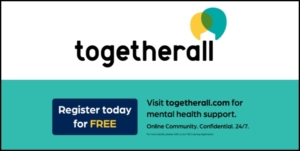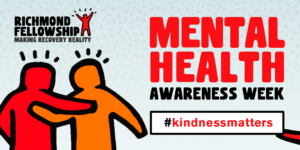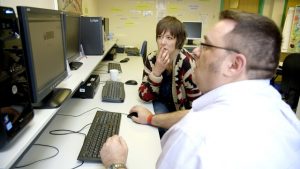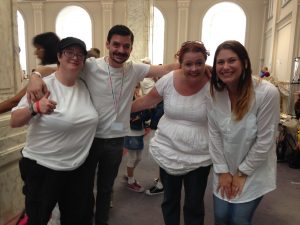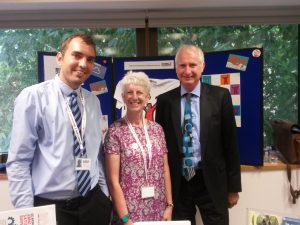We are proud to be part of Recovery Focus – a group of charities providing specialist support services to individuals and families living with the effects of mental ill health, drug and alcohol use, gambling and domestic abuse. This week all our partner charities are highlighting the work and impact of #OurCommunityServices across the group.
We heard from Wiltshire RSI about what they’ve been up to and how they have responded to Covid-19 restrictions. Wiltshire RSI also shared some great testimonials from people they’ve supported as well as giving us some insight into what it’s like to work in a Community Service.
What has Wiltshire RSI been up to?
Wiltshire RSI have been working hard to ensure their community still feel connected during lockdown. They started the Lockdown Well-Being Challenge, which included four wellbeing goals per week of the November lockdown. They focused on bringing people together on their social media pages and online social group to share their achievements and creations during lockdown. Wiltshire RSI’s online social group has grown from strength to strength in the last 12 months. They were able to enjoy some in person and virtual events whilst they could last summer, including their picnic for recovery and pop-up event at Trowbridge sensory garden.
Wiltshire RSI have been working to support those in the community with sensory disturbances, they did this by setting up the Hearing Voices Group. The aim of the group is to provide a safe space for people in the community who experience sensory disturbances (e.g. auditory or visual) to come together and share their experiences and coping strategies in order to provide mutual support. During the pandemic this group is one that went online and is continuing to run via Zoom.
Wiltshire RSI has also been conducting some important research that identifies what service provision is available to those in the LGBTQ+ community and how the service can improve their accessibility. Wiltshire RSI are also working to establish similar research for the BAME community and for people with Autism. This is part of an ongoing development of how the service meets the needs of its community.
Hearing from our staff
As part of #OurCommunityServices at Recovery Focus we were able to hear what it’s like to work in a Community Service from a Community Link Advisor and Volunteer/Peer Support Coordinator, they also gave an insight into how Wiltshire RSI has digitally adapted to the pandemic. Check out what they had to say!
Why do you enjoy working in our community services? What does community services mean to you?
“I enjoy working in the community services because I like making a positive impact on individuals’ lives. I like watching individuals grow in confidence and truly helping to get them back into the community. I feel that every person should be given a chance to achieve things in their lives no matter how big or small. I enjoy being able to build good relationships with service users, their families and other colleagues which enables them to get the best support tailored to them.” Community Link Advisor
What does a day to day look like working in our community services?
“A typical day working with Richmond Fellowship Community Service is supporting someone with their confidence, their wellbeing, helping them gain their independence backu and helping with social inclusion. Since Covid-19 restrictions have been put in place my typical day to day has changed. I am now supporting people digitally and helping them get online more. This can be by helping them get on zoom and joining online groups instead of a face-to-face group. Although my day to day has changed, I still support service users with their confidence and getting back into the community.” Community Link Advisor
“My current role as Peer/Volunteer Coordinator working from home within Covid-19 restrictions is very different to 12 months ago. My support and coordinating responsibilities are all carried out in “virtual 1:1” format, using audio and video platforms. Many new ideas have been developed and will be taken forward as appropriate, when “normal” operational procedures are back in place.” Volunteer/Peer Support Coordinator
What impact does your service have on the people you support and the wider community?
“I feel it has a massive impact on the people we support. We give them hope and a purpose as we help them achieve small meaningful goals that they set themselves. Our support is very service user led and we will work with them to develop their own ideas in to achievements. For example we will support someone in attending a local group and once their confidence has grown we will then step back and let them gain their independence.” Community Link Advisor
“It is a major contributing factor in clients’ mental health recovery journey. It also produces benefit for the wider community via the impact of people engaging in a widening range of community based activities.” Volunteer/Peer Support Coordinator
How has COVID19 and lockdown restrictions changed the way you deliver your service?
“We have had to adapt to the changing restrictions in order to offer a range of support to our clients. We have had to minimise face to face appointments to stop the spread of Covid-19. This has meant that group activities, public transport and volunteering have had to be placed on hold meaning that social inclusion is decreasing, some individuals haven’t been able to socialise or make new friends. However this impact resulted in Richmond Fellowship becoming more digitally focused. I have been doing zoom calls and zoom groups with service users and Richmond Fellowship have created a fun weekly zoom social which has had a positive impact on people’s wellbeing. This is because they are able to socialise and chat to others even though they are at home.” Community Link Advisor
What has your service learnt from the pandemic and what will you continue to do as we move out of lockdown?
“We have learnt that we work well as a team. We have provided support to colleagues/friends when things have been challenging. I definitely know that without the support from my colleagues I wouldn’t have been able to get through the pandemic.
We will continue to provide a tailored support to service users and support them to increase independence and social inclusion.” Community Link Advisor
“Everyone has been affected in different ways, and virtual support is not always easy to provide. We will no doubt take the best of Covid-19 restriction procedures and blend them into post lockdown operational strategies.” Volunteer/Peer Support Coordinator
What is to come for your community service?
“Richmond Fellowship is going through the tender process currently. Although uncertain of what is to come we do know what we will be delivering the best support we can to our clients.” Community Link Advisor
“A new 5 year contract hopefully: Resulting from a tendering process currently in its final stages.” Volunteer/Peer Support Coordinator
Hearing from the people we support
The work our Community Service staff have been putting in has been remarkable in ensuring communities remain connected and that we minimise social isolation. But let’s hear from the people we support about how the Wiltshire RSI service has positively impacted their lives:
“It’s meant an awful lot. It’s like a little family of staff and friends who I know I can talk to and be honest to. It’s helped me feel I have value and purpose.”
“Seeing people (like yourself) managing your mental health was important. It’s actually meeting people with lived experienced that is the key. The feeling of not being alone has helped me to accept the illness. I’m not happy about it but I think I just accept it is what it is.”
“My support worker made a plan with me which we have both worked towards. I am now able to go out and about on my own, which I haven’t been able to do for nearly 5 years. This has really improved the quality of life.”
“My support worker made me feel like a person and with Richmond Fellowship’s support my confidence has improved and I feel more able to live a better life.”
We are so glad to hear such positive feedback about our Wiltshire RSI Community Service! Thank you to the Wiltshire RSI team for your support in Community Services Week. Make sure you continue to follow along with the week on #OurCommunityServices and follow the social media accounts across the group! Find out more about Wiltshire RSI and how you can get in contact with them here.
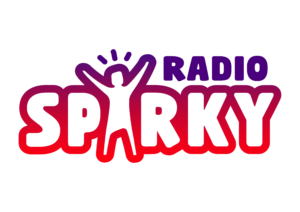 Listen to our latest edition of Radio Sparky, the podcast which shines the spotlight on the excellent work happening at Richmond Fellowship services across the country.
Listen to our latest edition of Radio Sparky, the podcast which shines the spotlight on the excellent work happening at Richmond Fellowship services across the country.





